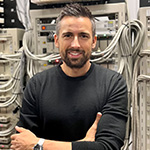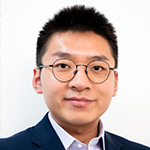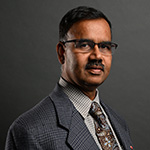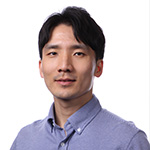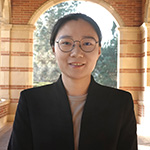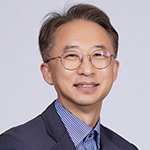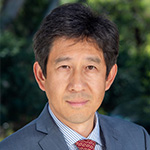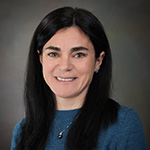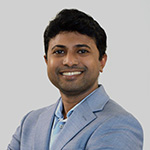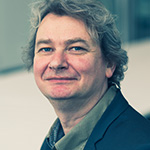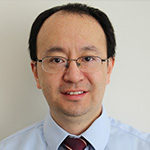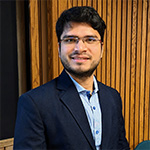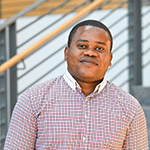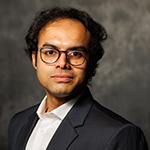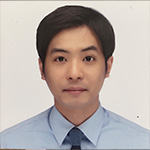Battery Division Early Career Award Sponsored by Neware Technology Limited
Wednesday, October 15 | 1430h
Salon A-4 (Lower Level, Hilton Chicago)
Replacing Inactive Components to Improve Li- and Na-ion Cells
By Michael Metzger
Michael Metzger is the Herzberg-Dahn Chair for Advanced Battery Research and a Professor of Physics at Dalhousie University where he teaches undergraduate and graduate courses on Modern Physics, Sustainable Energy, and Advanced Energy Storage. At Dalhousie, Dr. Metzger leads a diverse group of young researchers who work on advanced lithium- and sodium-ion batteries. His group discovered the decomposition of polymer tapes in battery cells which leads to self-discharge. He is one of the three principal investigators in the Tesla-Dalhousie research partnership on long-lived and safe high-energy batteries based on sustainable, low-cost materials. This is Tesla’s only academic research partnership.
Prof. Metzger received his PhD from the Technische Universität München, where he developed new methods to study the degradation of lithium-ion batteries in close collaboration with BASF and BMW (2013-2017). He co-developed online electrochemical mass spectrometry, an ultra-sensitive gas analysis technique that allows detection of small quantities of unwanted gases to diagnose battery cells. Dr. Metzger focused on solid state lithium batteries, fuel cells, and water desalination as a Senior Research Engineer for Robert Bosch LLC (2017-2020), then joined the faculty at Dalhousie in 2021. He joined ECS while a graduate student in 2014.
Battery Division Postdoctoral Associate Research Award Sponsored by MTI Corporation and the Jiang Family Foundation
Wednesday, October 15 | 1450h
Salon A-4 (Lower Level, Hilton Chicago)
Molecular LOGICS of Li Metal Battery: From Interface to Interphase
by Weilai Yu
Weilai Yu is (Incoming) Assistant Professor in the Department of Chemical Engineering and Applied Chemistry at the University of Toronto. He leads the LOGICS Laboratory, which integrates electrochemical, surface, and materials science to accelerate the development of next-generation technologies for energy conversion and storage. His ongoing research focuses on systematically elucidating how molecular interactions at nanoscale material interfaces govern the macroscale performance of chemical and energy conversion systems.
Prof. Yu was a Visiting Undergraduate Student at Harvard University in the spring of 2015 while studying for his BS in Chemistry from Wuhan University (2016). He joined ECS as a student in 2019, completing his PhD in Chemistry in 2021 at the California Institute of Technology with Profs. Nathan S. Lewis and Harry B. Gray. His doctoral research provided mechanistic insights into the long-term durability of semiconductor photoelectrodes for solar fuel production. From 2021 to 2024, he was a Postdoctoral Scholar in Chemical Engineering at Stanford University, collaborating with Profs. Zhenan Bao and Yi Cui to investigate the reactivity of liquid electrolytes in high-energy lithium metal batteries. Among his honors, Dr. Yu was selected as a Young Scientist to attend the 71st Lindau Nobel Laureate Meeting in Chemistry. He currently serves on the Community Editorial Board of the Royal Society of Chemistry’s Materials Horizons.
Battery Division Research Award
Wednesday, October 15 | 1530h
Salon A-4 (Lower Level, Hilton Chicago)
Advances in Lithium Metal Batteries
by Venkataraman Thangadurai
Venkataraman Thangadurai is a professor and Chair in Energy at the School of Chemistry, University of St Andrews and inaugural Faraday Institution Adjunct Professor at the School of Chemistry there. He has 30+ years of experience in solid state chemistry and is a pioneer in the development of solid state electrolytes, especially garnet-type Li-ion conductors, and electrodes for electrochemical energy storage and conversion devices. His current research activities include the discovery of novel solid state electrolytes for fast Li-ion and Na-ion conduction, and metallic electrodes for advanced solid state metal batteries and solid oxide cells.
Prof. Thangadurai received his PhD from the Indian Institute of Science, Bangalore in 1999. He completed postdoctoral fellowships at the Universität zu Kiel and Alexander von Humboldt-Stiftung. Universität zu Kiel awarded him the Dr. hab (2004). He is a Fellow of The Electrochemical Society, Royal Society of Chemistry (UK), and Royal Society of Canada and received the 2024 ECS Canada Section R. C. Jacobsen Award, 2023 University of Calgary Research Excellence Chair, 2021 Canadian Society for Chemistry Research Excellence Award in Materials Chemistry, and 2016 Chemical Institute of Canada Keith Laidler Award. He published 270 peer-reviewed papers in journals (h-index of 70). Dr. Thangadurai is co-founder of two start-ups based on his lithium ion electrolytes research. He joined the Society in 2000 and has been active with the ECS Canada Section, ECS Battery Division, Publications Subcommittee, and Sensors Plus Editorial Advisory Committee.
Battery Division Student Research Award Sponsored by Mercedes-Benz Research & Development
Wednesday, October 15 | 1410h
Salon A-4 (Lower Level, Hilton Chicago)
Unveiling Lithium Superionic Conduction in Halide Solid Electrolytes
by Seungju Yu
Seungju Yu recently completed his PhD in Materials Science and Engineering at Seoul National University under the supervision of Professor Kisuk Kang. His research focuses on the advancement of materials for next-generation lithium ion batteries, including all-solid-state battery systems. By combining computational modeling with experimental validation, he investigated lithium ion diffusion mechanisms in halide solid electrolytes. His work established a novel design principle for halide solid electrolytes by revealing the dual role of cation disordering as both a diffusion inhibitor and a structural pillar. This insight provided a foundational framework for the rational design of superionic conductors, leading to the publication of multiple research papers in journals, including Science and Nature Communications. He completed his undergraduate studies at Seoul National University.
Battery Division Student Research Award Sponsored by Mercedes-Benz Research & Development
Wednesday, October 15 | 1350h
Salon A-4 (Lower Level, Hilton Chicago)
Multi-Faceted Roles of Lithium Metal in Batteries and Beyond
by Xintong Yuan
Xintong Yuan is a PhD candidate in Chemical Engineering at the University of California, Los Angeles, working with Prof. Yuzhang Li on next-generation batteries, exploring the fundamentals of lithium metal deposition, and the formation of solid electrolyte interphase using cryo-EM. Specifically, Xintong’s research tackled a decades-old question in battery research: what is the intrinsic morphology of lithium deposits in the absence of a solid electrolyte interphase layer? Xintong revealed the intrinsic lithium nucleation morphology to be that of a non-dendritic rhombic dodecahedron that is independent of electrolyte chemistry or substrate composition. Her unexpected findings transformed how the field thinks about lithium metal electrodeposition and provides new insights into avoiding key failure modes during fast charging of lithium metal batteries.
Xintong was recognized as a Massachusetts Institute of Technology (MIT) Chemical Engineering Rising Star and Materials Science and Engineering Rising Star (co-organized by MIT, Stanford University, Carnegie Mellon University, and the University of Illinois Urbana-Champaign). She received a Materials Research Society Graduate Student Gold Award and American Institute of Chemical Engineers Women in Chemical Engineering Travel Award. Xintong is a member of the 2025 class of next-generation researchers pursuing postdoctoral studies with support from the global Schmidt Science Fellowship. She authored 21 journal publications, including five as first author.
Battery Division Technology Award
Wednesday, October 15| 1610h
Salon A-4 (Lower Level, Hilton Chicago)
Upscaling High-Energy Battery Electrodes
by Sang-Young Lee
Sang-Young Lee is Distinguished Professor in the Department of Chemical and Biomolecular Engineering at Yonsei University and a director of the Yonsei Battery Research Center. With a career spanning 11 years in industry and 16 years in academia, he has contributed to battery science through academic research, industry collaborations, entrepreneurial initiatives, and esteemed memberships. His research interests include high-mass-loading electrodes, organic material-based solid state batteries, cellulose-based paper batteries, and flexible, wearable power sources.
Prof. Lee received a BA in Chemical Engineering from Seoul National University (1991), and MS (1993) and PhD (1997) in Chemical Engineering from the Korea Advanced Institute of Science & Technology. He conducted postdoctoral research at the Max-Planck-Institut für Polymerforschung from 2001 to 2002. As Principal Research Scientist at LG Chem’s Battery R&D Center from 1997 to 2008, Prof. Lee led the development of ceramic-coated separators (SRS®), a breakthrough technology that significantly improved battery safety and is now a global industry standard in EV batteries. He is a Fellow of the Korean Academy of Science and Technology, and National Academy of Engineering of Korea. The author of over 230 peer-reviewed publications with over 15,000 citations and an h-index of 70, he has filed more than 300 patents. Prof. Lee co-founded the start-up, UBATT Co., Ltd, developing advanced high-energy batteries for applications in aviation and robotics. He is an editor of the Journal of Power Sources.
Battery Division Technology Award
Wednesday, October 15| 1650h
Salon A-4 (Lower Level, Hilton Chicago)
Advancing High Energy Density Batteries Through Electrode Binder Innovation
by Gao Liu
Gao Liu is a Senior Scientist and Group Leader of the Applied Energy Materials Group at Lawrence Berkeley National Laboratory. With over 20 years of experience in electrical energy storage, his research integrates synthetic chemistry, composite engineering, and electrochemistry to address interdisciplinary challenges in the field. Dr. Liu’s lab employs advanced diagnostics to understand fundamental issues in energy materials and systems. They also utilize synthetic techniques to develop functional materials that enhance system performance. Dr. Liu pioneered research on multifunctional conductive polymer adhesives and made significant contributions to understanding polymeric binder behavior in composite electrodes. This work enabled the rational design of functional binders for emerging storage chemistries. His current research spans a wide range of topics, including electrode binders, silicon, sulfur, and lithium metal materials, as well as electrode engineering, electrolytes and additives, and solid state conductors. Beyond energy storage, Dr. Liu also conducts materials and engineering research in building resiliency, the circular economy, and advanced manufacturing.
Dr. Liu serves as the Battery Energy Storage Systems (BESS) Consortium lead and coordinator for the Net Zero World Initiative, a global partnership dedicated to helping countries achieve their climate goals and accelerate transitions to net zero and resilient and inclusive energy systems. He is a Fellow of The Electrochemical Society and received 2013, 2015, and 2022 R&D 100 Awards, and the 2014 FMC Corporation Scientific Achievement Award. The author of 200+ peer-reviewed publications, he holds over 28 granted patents. A longtime ECS member, Dr. Liu is active in the ECS San Francisco Section (chairing it from 2022-2024) and Battery Division. He organizes the ongoing ECS Meeting electrode binder symposium series, sponsored by the Battery and Energy Technology Divisions.
Corrosion Division Early-Career Award
Tuesday, October 14 | 1450h
Conference Room 4G (Fourth Floor, Hilton Chicago)
Localized corrosion: Investigating the Controlling Environmental Variables
by Rebecca Schaller
Rebecca Schaller is a Materials Scientist and principal member of the technical staff in the Materials Reliability Group at Sandia National Laboratories (SNL). Her work focuses on developing techniques to analyze corrosion at the local scale and extrapolate to the macroscopic level, improving real-world degradation predictions.
While earning her PhD at the University of Virginia with Dr. John Scully (2016), she received an Endeavour Research Fellowship to do research in Australia with Monash University and CSIRO (the Australian Commonwealth Scientific and Industrial Research Organization). After graduating, she spent two years as a postdoctoral appointee at Sandia National Laboratories, followed by an assistant professorship position at the University of British Columbia. She returned to SNL in 2019. Dr. Schaller received the 2023 PATRAM Aoki Distinguished Oral Presentation Award, 2022 Sandia Postdoc Development Distinguished Mentor Award, and 2018 ECS Corrosion Division Morris Cohen Graduate Student Award. She coauthored the 2025 Ivy M. Parker Best Paper Published in Corrosion Journal. Dr. Schaller joined ECS in 2011 and served on the Interdisciplinary Science and Technology Subcommittee. Since 2020, she has been on the ECS Corrosion Division Executive Committee where she is currently Vice Chair.
Corrosion Division H. H. Uhlig Award
Tuesday, October 14 | 1630h
Conference Room 4G (Fourth Floor, Hilton Chicago)
Coupling Electrochemical Methods with Ion Beam or Neutron Beam Techniques in situ for Corrosion Studies
by James Noël
James Noël is Associate Professor of Chemistry at Western University. An electrochemist and corrosion scientist, his research includes studies of the degradation of nuclear fuel and container materials for permanent disposal of nuclear fuel waste. He leads a large and diverse research group that conducts experimental research on aspects of the corrosion of copper, carbon steel, uranium dioxide, stainless steels, nickel alloys, and other materials. His industry research partners include the Nuclear Waste Management Organization, Swedish Nuclear Fuel and Waste Management Company, National Cooperative for the Disposal of Radioactive Waste, Nuclear Waste Management Organization of Japan, Canadian Nuclear Laboratories (Chalk River), and others.
Prof. Noël completed his BSc and MSc degrees at the University of Guelph, supervised by Dr. Jacek Lipkowski. He then worked on corrosion issues in the nuclear industry while employed by Ontario Hydro Research and later, Atomic Energy of Canada Limited (AECL). While at AECL, Prof. Noël earned his PhD at the University of Manitoba with David Shoesmith and Hymie Gesser as supervisors. He joined Western as Research Scientist in 1998 and became a faculty member in 2016. He is an Associate Editor of CORROSION Journal and Fellow of The Electrochemical Society. His awards include the ECS Canada Section’s R. C. Jacobsen and W. Lash Miller Awards, Western University Distinguished Research Professorship, Faculty Scholar Award, and Florence Bucke Science Prize. He co-authored over 150 refereed journal articles, 50 refereed conference proceedings papers, 20 commercial reports, and six book chapters. Prof. Noël joined ECS in 1996 and became a Life Member in 2022. He has been active on the ECS Board of Directors (2020 – 2022) and standing committees, along with the ECS Canada Section (Chair, 2005 – 2007), ECS Corrosion Division (Chair, 2022-2024), and Education Committee (Chair, 2016 – 2021). At Society biannual meetings, he teaches Fundamentals of Electrochemistry Short Courses.
Corrosion Division Morris Cohen Graduate Student Award
Tuesday, October 14 | 1410h
Conference Room 4G (Fourth Floor, Hilton Chicago)
Corrosion Mechanisms and Passive Film Evolution in Nanostructured Al Alloys with Far-from-Equilibrium Compositions
by Jijo Christudasjustus
Jijo Christudasjustus is a Postdoctoral Research Associate in the Physical and Computational Sciences Directorate at Pacific Northwest National Laboratory (PNNL). His research focuses on corrosion science, alloy development, and the advanced characterization of materials exposed to extreme environments. With expertise in both in situ and ex situ transmission electron microscopy (TEM), he investigates degradation mechanisms at the nanoscale, aiming to improve the performance and durability of structural materials. Currently, at PNNL, his research is expanding to study the effects of irradiation and molten salt corrosion on advanced reactor materials, funded by the Department of Energy’s Energy Frontiers Research Center, specifically the Fundamental Understanding of Transport under Reactor Extremes. His research supports the development of resilient materials for next-generation nuclear energy systems and high-temperature environments.
Dr. Christudasjustus earned his PhD with funding from the National Science Foundation, at North Carolina State University, focusing on the corrosion behavior of nanostructured and far-from-equilibrium aluminum alloys. His work demonstrated that strategic solute additions can improve mechanical strength and enhance corrosion resistance by stabilizing passive films, disrupting defect pathways, and promoting repassivation. Dr. Christudasjustus’ contributions provided valuable insights into solute-driven mechanisms that govern passivity and breakdown in lightweight alloys. He joined ECS in 2023.
Corrosion Division Rusty Award for Mid-Career Excellence
Tuesday, October 14 | 1550h
Conference Room 4G (Fourth Floor, Hilton Chicago)
Strategic Selection of Materials for Pyroprocessing of Used Nuclear Fuel: Understanding Corrosion Behavior in Molten Salt Systems
by Dev Chidamabaram
Dev Chidambaram is Professor of Materials Science and Engineering at the University of Nevada, Reno (UNR). His research explores the relationship between surface chemistry and the electrochemical properties of materials, with a primary focus on corrosion behavior. He is known for his work on molten salts and the use of a complementary suite of analytical techniques.
Prof. Chidambaram holds degrees in chemical and electrochemical engineering, biomedical engineering, and materials science and engineering, earning his PhD in Materials Science and Engineering from the State University of New York at Stony Brook (2003). After completing his doctorate, he served as a Goldhaber Distinguished Fellow and Staff Associate Scientist at Brookhaven National Laboratory. In 2009, he joined the Chemical and Materials Engineering Department at UNR, where he was promoted to Associate Professor and then Professor. As Principal Investigator of UNR’s Materials and Electrochemical Research Laboratory, he secured over $20 million in research funding, graduated 31 students, and mentored over 30 undergraduate students. He currently advises seven doctoral candidates.
Prof. Chidambaram authored over 275 publications and presentations and holds five issued US patents. He was named Regents Distinguished Researcher by the State of Nevada in 2023. His work has also been recognized by the International Society for Electrochemistry, American Vacuum Society, and Society for Applied Spectroscopy. An active ECS member since 1996, he organized over 30 symposia including a specialized series on corrosion in nuclear systems and state-of-the-art techniques in corrosion. He served on the Society’s Board of Directors (2022 – 2024), chaired the ECS Corrosion Division, and was a member of the Interface Advisory Board (2018-2024). He currently serves on the ECS Honors & Awards Committee and Interdisciplinary Science and Technology Subcommittee.
Electrodeposition Division Research Award
Wednesday, October 15| 1400h
Salon C-3 (Lower Level, Hilton Chicago)
Morphology Control During Electrodeposition: An Interplay of Surface Chemistry and Interphase Formation
by Philippe Vereecken
Philippe M. Vereecken is Fellow at imec and part-time Professor at Katholieke Universiteit Leuven. His expertise in electrochemistry, nanomaterials, and semiconductors has been successfully implemented in applications for lithium batteries, electrolysers, and gas-diffusion-electrodes for water electrolysis and CO2 electroreduction. Electrodeposition continues to play a central role in his research, recently in particular, the electrodeposition of passivated lithium and the electrochemical-induced deposition (ECiD) of non-conducting thin-films such as silica and phosphates.
Prof. Vereecken holds a PhD in Chemistry from Universiteit Gent (1998) and PhD in the field of semiconductor electrochemistry. He continued his academic career as a postdoc with Prof. Peter Searson at Johns Hopkins University (1998-2001), investigating electrodeposition of magnetic and magneto-resistive thin films and nanocomposites. He then joined IBM as a Research Staff Member at the T. J. Watson Research Center, working on damascene copper electroplating processes with Dr. Panayotis Andricacos (2001-2005). He developed the first 300 mm direct plating process, studied the underlying mechanisms of copper electrodeposition, and was part of Dr. Frances Ross’s team which used transmission electron microscopy to show, for the first time, electrochemical nucleation and growth in real-time. In 2005, Dr. Vereecken joined imec in Belgium, exploring growth and integration of nanowires and carbon nanotubes for (post)CMOS applications. He was appointed Professor in the Bioscience Engineering faculty at KU-Leuven in 2009. Dr. Vereecken authored and co-authored over 230 scientific publications and is inventor and co-inventor of more than 60 patent families. Since joining ECS in 2000, he served on the ECS Board of Directors (2019-2021), has been active with the ECS Electrodeposition Division (Chair, 2019-2021) and many of its committees, ECS Belgium Student Chapter Faculty Advisor, and on the Interface Advisory Board.
Electrodeposition Division Early Career Award
Wednesday, October 15 | 1440h
Salon C-3 (Lower Level, Hilton Chicago)
Seeking Stability in Electrodeposition: Understanding Dendrites, Degradation, and Delamination
by Adam Maraschky
Adam Maraschky is an Electrochemistry Team Leader at Electra, a start-up working to revolutionize ironmaking. He supervises scientists, engineers, and technicians developing iron electrowinning cell components. His research spans Li, Zn, Fe, and Sn electrodeposition, as well as molten salt electroanalytical chemistry, with a focus in electrode-electrolyte and separator-electrolyte interfaces.
Dr. Maraschky earned his PhD in Chemical Engineering from Case Western Reserve University (2020), focusing on the fundamental mechanisms of dendrite formation in lithium electrodeposition. As a Postdoctoral Researcher at Sandia National Laboratories from 2021 to 2023, he investigated alkali metal battery technologies. In 2018, he received the ThinkEnergy Fellowship sponsored by the Great Lakes Energy Institute. Beyond the lab, Adam is an avid photographer and first became interested in chemistry and physics through his passion for analog image making. He joined ECS in 2017 and was a member of the ECS Case Western Reserve University Student Chapter.
Energy Technology Division Walter Van Schalkwijk Award in Sustainable Energy Technology
Tuesday, October 24 | 1720h
Waldorf (Third Floor, Hilton Chicago)
Integrated Electrocatalytic Strategies for CO₂ Capture, Conversion, and C–N Coupling
by Wenzhen Li
Wenzhen Li is Professor and Stiles Faculty Fellow in the Department of Chemical and Biological Engineering at Iowa State University. His research focuses on catalysis, electrochemical energy conversion, paired electrolysis and biorenewables, and waste plastics upcycling. A pioneering researcher in the application of carbon nanomaterials for fuel cells, Prof. Li was among the first to discover potential-regulated polyol electro-oxidation for producing value-added oxygenated chemicals. His recent work spans electrocatalyst design, electrochemical conversion of biomass and plastics to fuels and chemicals, green fertilizer synthesis, carbon dioxide capture and reduction, electrochemical C-N coupling, and innovative paired electrolyzer systems. His impactful contributions to electrochemical science and engineering continue to advance the frontiers of sustainable energy technologies.
Prof. Li earned his PhD with honors from the Dalian Institute of Chemical Physics, Chinese Academy of Sciences (2004), then conducted postdoctoral research with Prof. Masahiro Watanabe at the University of Yamanashi and Prof. Yushan Yan at the University of California, Riverside. Prior to joining Iowa State in 2014, he was a Research Scientist at the State University of New York Albany’s College of Nanoscale Science and Engineering and served as Assistant and Associate Professor at Michigan Technological University. Prof. Li published over 130 peer-reviewed articles with more than 19,000 citations with an h-index of 74. He holds nine issued U.S. patents. A Fellow of the Royal Society of Chemistry, he received multiple research awards from Michigan Tech and Iowa State. Dr. Li joined ECS in 2003. He is a Member at Large of the ECS Industrial Electrochemistry and Electrochemical Engineering Division.
Industrial Electrochemistry and Electrochemical Engineering Division Ralph E. White Outstanding Student Award
Sunday, October 12 | 1640h
Conference Room 4D (Fourth Floor, Hilton Chicago)
Mechanistic Interrogation of Solid-State Electrode Architectures
by Kaustubh Girish Naik
Kaustugh Girish Naik is a fourth year PhD candidate in the Energy and Transport Sciences Laboratory, School of Mechanical Engineering at Purdue University. His PhD research pioneers the development of a comprehensive suite of physics-based modeling frameworks for solid state battery electrodes and interfaces, revealing critical insights into the complex mechanistic interactions in solid state batteries, focusing on electro-chemo-mechanical phenomena, thermo-electrochemical dynamics, and microstructural stochastics. His work elucidates the stability landscape and key limiting mechanisms for solid-solid interfaces, thereby delineating design guidelines for the development of stable, high-performance solid state batteries.
Naik has BTech and MTech degrees in Mechanical Engineering from the Indian Institute of Technology Kharagpur (IIT). His research appears in journals including Advanced Energy Materials, Energy Storage Materials, Applied Mechanics Reviews, and ACS Applied Materials and Interfaces. He presented at ECS Meetings; the Gordon Research Seminar and Conference on Batteries; Minerals, Metals & Materials Society Conference; and International Mechanical Engineering Congress & Exposition. Naik was awarded Purdue University’s 2023 Bilsland Dissertation Fellowship, and Trailblazer in Engineering Fellowship. He received an ECS Travel Grant to attend the 244th ECS Meeting in Gothenburg, Sweden.
Industrial Electrochemistry and Electrochemical Engineering Division Student Achievement Award
Wednesday, October 15 | 1340h
Conference Room 4C (Fourth Floor, Hilton Chicago)
Strategies for Sustainable Ethylene, Ethanol, and Acetate via Electrochemical CO₂ Reduction
by Monsuru Olatunji Dauda
Monsuru Olatunji Dauda is a PhD candidate in Chemical Engineering at Louisiana State University (LSU), conducting research under Professor John C. Flake. His research focuses on sustainable chemical production through the electrochemical conversion of CO₂ into valuable chemicals and fuels. By leveraging advanced analytical tools, electrochemical techniques, and computational methods, his work aims to improve the selectivity, activity, and durability of CO₂ conversion processes, addressing critical challenges in sustainability and contributing to the reduction of atmospheric CO₂ levels.
Dauda completed a BTech in Chemical Engineering at Ladoke Akintola University of Technology and MS in Chemical Engineering at LSU. Upon completing his PhD, Dauda plans to advance sustainable technologies and mitigate greenhouse gas emissions. He is committed to fostering partnerships with industry to ensure that his research translates into real-world solutions, contributing to a cleaner and greener future. He received an ECS F. M. Becket Fellowship for study over the summer of 2025.
Industrial Electrochemistry and Electrochemical Engineering Division Student Achievement Award
Monday, October 13 | 1140h
Conference Room 4D (Fourth Floor, Hilton Chicago)
Making the State of the Art of Electrochemical Energy and Carbon Conversion Economically Viable through Efficient Process Integration
by Deepra Bhattacharya
Deepra Bhattacharya is a Research Scientist at GE Vernova. Before completing his PhD, he worked on post-combustion carbon capture membranes at the University of Manchester and on solid oxide fuel cells at the Central Glass and Ceramic Research Institute (CSIR). He obtained his PhD at The Pennsylvania State University (2021), developing morphology controlled precious metal nanostructures aided by block copolymer self-assembly to probe the dependence of catalyst electroactivity on geometry. Before joining GE Vernova in 2023, he worked briefly on carbon dioxide electroreduction as a postdoctoral researcher at the National Renewable Energy Laboratory.
Sensor Division Early Career Award
Monday, October 13 | 1140h
Mobley (Lower Level, Hilton Chicago)
Small and Simple by Design: Electrochemical Systems for Modern Analytical Chemistry and Energy Sustainability
by Itthipon Jeerapan
Itthipon Jeerapan is Assistant Professor in the Division of Physical Science at Prince of Songkla University. His research, which lies at the intersection of electrochemistry, analytical chemistry, bioelectronics, and advanced materials, emphasizes the development of miniaturized, wearable, ingestible, and implantable electrochemical platforms for diverse applications in healthcare, food sensing, environmental monitoring, and energy systems. He made significant pioneering contributions to the fields of self-powered biosensors and enzymatic biofuel cells, combining innovative material design with electrochemical functionality to enable autonomous, real-time sensing solutions.
Prof. Jeerapan earned his BS in Chemistry with First Class Honors from Prince of Songkla University and completed his MS and PhD in NanoEngineering at the University of California, San Diego. His undergraduate and graduate education in the fields of chemistry, science, and technology was supported by a Royal Thai Government scholarship. He joined ECS in 2018, is an Associate Editor of Sensors Plus, and has served on the ECS Joint Editorial Board since 2023. Prof. Jeerapan received numerous honors including the 2025 Federation of Asian Chemical Societies Award for Distinguished Young Chemist, 2024 Thailand Young Scientist Award, 2022 Chemical Society of Thailand Distinguished Young Chemist Award, and the 2021 National Research Council of Thailand Outstanding Dissertation Award. He was recognized among the World’s Top 2% Scientists in 2023 and 2024 and is the author of over 70 publications with more than 5,550 citations and an h-index of 30.
Sensor Division Student Research Award
Monday, October 13 | 1120h
Mobley (Lower Level, Hilton Chicago)
Development of Molecularly Imprinted Polymer (MIP)-Based Sensors for the Sensitive and Selective Detection of Analytes
by Wonhyeong Kim
Wonhyeong Kim is a Postdoctoral Research Associate at the University of Arizona. His research aims to advance scalable, cost-effective sensing platforms for real-world applications in food monitoring, clinical diagnostics, and environmental sensing. With his strong background in materials chemistry and sensor design, he is passionate about integrating polymer science, electrochemistry, and device engineering to solve emerging challenges in analytical technology. His work includes the fabrication of chemiresistive gas sensors and electrochemical liquid sensors targeting furaneol (a strawberry flavor biomarker) and the stress biomarker hormone cortisol. He performed systematic comparisons between insulating and conducting MIPs, with particular emphasis on the role of functional group chemistry and hydrogen bonding in imprinting efficiency.
Dr. Kim’s BS in Textile Engineering from Kyungpook National University focused on functional materials and surface engineering. His PhD in Materials Engineering from Auburn University under Dr. Dong-Joo Kim centered on the development of molecularly imprinted polymer (MIP)-based electrochemical sensors for the selective and sensitive detection of chemical and biological analytes. By incorporating conducting polymers into the MIP matrix, he addressed limitations such as low electrical conductivity and limited binding site accessibility. Dr. Kim is the author of several first-author publications in peer-reviewed journals including ACS Sensors, ACS Applied Polymer Materials, and ECS Sensors Plus.

